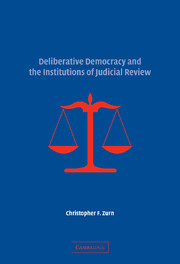Book contents
- Frontmatter
- Contents
- Acknowledgments
- 1 Introduction
- 2 Majoritarian Democracy and Minoritarian Constitutionalism
- 3 From Majoritarian to Deliberative Theories of Constitutional Democracy
- 4 Deliberative Democracy and Substantive Constitutionalism
- 5 Disagreement and the Constitution of Democracy
- 6 The Seducements of Juristic Discourse as Democratic Deliberation
- 7 Constitutionalism as the Procedural Structuring of Deliberative Democracy
- 8 The Institutions of Constitutional Review I: Design Problems and Judicial Review
- 9 The Institutions of Constitutional Review II: Horizontal Dispersal and Vertical Empowerment
- Bibliography
- Index
- Table of Cases
7 - Constitutionalism as the Procedural Structuring of Deliberative Democracy
Published online by Cambridge University Press: 18 July 2009
- Frontmatter
- Contents
- Acknowledgments
- 1 Introduction
- 2 Majoritarian Democracy and Minoritarian Constitutionalism
- 3 From Majoritarian to Deliberative Theories of Constitutional Democracy
- 4 Deliberative Democracy and Substantive Constitutionalism
- 5 Disagreement and the Constitution of Democracy
- 6 The Seducements of Juristic Discourse as Democratic Deliberation
- 7 Constitutionalism as the Procedural Structuring of Deliberative Democracy
- 8 The Institutions of Constitutional Review I: Design Problems and Judicial Review
- 9 The Institutions of Constitutional Review II: Horizontal Dispersal and Vertical Empowerment
- Bibliography
- Index
- Table of Cases
Summary
A PROVISIONAL SUMMARY: CRITERIA FOR AN ADEQUATE THEORY OF CONSTITUTIONAL REVIEW
In the past five chapters, I have presented various arguments for and against the institutionalization of the function of constitutional review in an electorally independent judiciary. Part of the point was to critically evaluate the respective positions in the interest of supporting and developing the most cogent and compelling account of constitutional review and its judicial institutionalization. But another point was to investigate the extent to which more recent normative political theories focused on deliberative democracy might provide more adequate conceptual and normative means for addressing the core tension underlying more traditional accounts of judicial review: namely, the apparent tension between constitutionalism and democracy.
Chapter 1 noted the extent to which interesting American jurisprudential theories, in attempting to come to terms with the countermajoritarian and quasi-paternalist character of judicial review as institutionalized and practiced in the United States, were led to develop normative political theories that significantly distorted the ideals of democracy and constitutionalism. I suggested there that a better approach to the problem would be one that started from the most plausible ideas of constitutional democracy and then proceeded to assess various arguments concerning how and where to locate the function of constitutional review, rather than attempting to significantly redefine the normative ideals of constitutional democracy in order to make them match the exact institutions and practices of constitutional review in a particular nation-state.
- Type
- Chapter
- Information
- Deliberative Democracy and the Institutions of Judicial Review , pp. 221 - 252Publisher: Cambridge University PressPrint publication year: 2007



